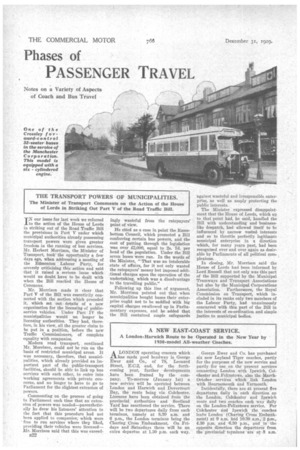Phases of PASSENGER TRAVEL
Page 56

If you've noticed an error in this article please click here to report it so we can fix it.
Notes on a Variety of Aspects of Coach and Bus Travel THE TRANSPORT POWERS OF MUNICIPALITIES.
The Minister of Transport Comments on the Action of the House of Lords in Striking Out Part V of the Road Traffic Bill.
Ts our issue for last week we referred IN the action of the House of Lords in striking out of the Road Traffic Bill the provisions in Part V under which municipal authorities already possessing transport powers were given greater freedom in the running of bus services. Mr. Herbert Morrison, the Minister of Transport, took the opportunity a few days ago, when addressing a meeting, of the Edmonton Labour Party, for severely criticizing this action and said that it raised a serious issue which would no doubt have to be dealt with when the Bill reached the House of Commons.
Mr. Morrison made it clear that Part V of the Bill was essentially connected with the section which preceded it, which set out details of a new organization for the licensing of publicservice vehicles. Under Part• IV the municipalities would no longer be licensing authorities. They had, therefore, in his view, all the greater claim to be put in a position, before the new Traffic Commissioners, of complete equality with companies.
Modern road transport, continued Mr. Morrison, could not be run on the basis of restricted municipal areas. It was necessary, therefore, that municipalities, which already provided an important part of the public-transport facilities, should he able to link up bus services with each other, to enter into working agreements with private concerns, and no longer to have to go to Parliament for the slightest extension of Powers.
Commenting on the process of going to Parliament each time that an extension of powers was needed—parenthetically he drew his listeners' attention to the fact that this procedure had not been applied to companies; which were ' free to run services where they liked, providing their vehicles were licensed— Mr. Morrison said that this was exceedn22 ingly wasteful from the ratepayers' point of view.
Be cited as a case in point the Ramsbottom Council, which promoted a Bill conferring certain bus powers, and the cost of putting through the legislation was over £2,000, equal to 2s. 7d. per head of the population. Under the Bill seven buses were run. In the words of the Minister, "That was an intolerable state of affairs, for it not only wasted the ratepayers' money but imposed additional charges upon the operation of the undertaking, which was a disadvantage to the travelling public."
Following up this line of argument, Mr. Morrison pointed out that when municipalities bought buses their enterprise ought not to be saddled with big capital charges swallowed up in Parliamentary expenses, and he added that the Bill contained ample safeguards
against wasteful and irresponsible enterprise, as well as amply protecting the public interests.
The Minister expressed disappointment that the House of Lords, which up to that point had, he said, handled the Bill with understanding and businesslike despatch, had allowed itself to be influenced by narrow vested interests and so to throttle perfectly legitimate municipal enterprise in a direction which, for many years past, had been recognized over and over again as desirable by Parliaments of all political complexions.
In closing, Mr. Morrison said the House of Lords had been informed by Lord Russell that not only was this part of the Bill supported by the Municipal Tramways and Transport Associations but also by the Municipal Corporations Association. Furthermore, the Royal Commission on Transport, which included in its ranks only two members of the Labour Party, had unanimously concurred with this part of the Bill in the interests of co-ordination and simple justice to municipal bodies.




































































































